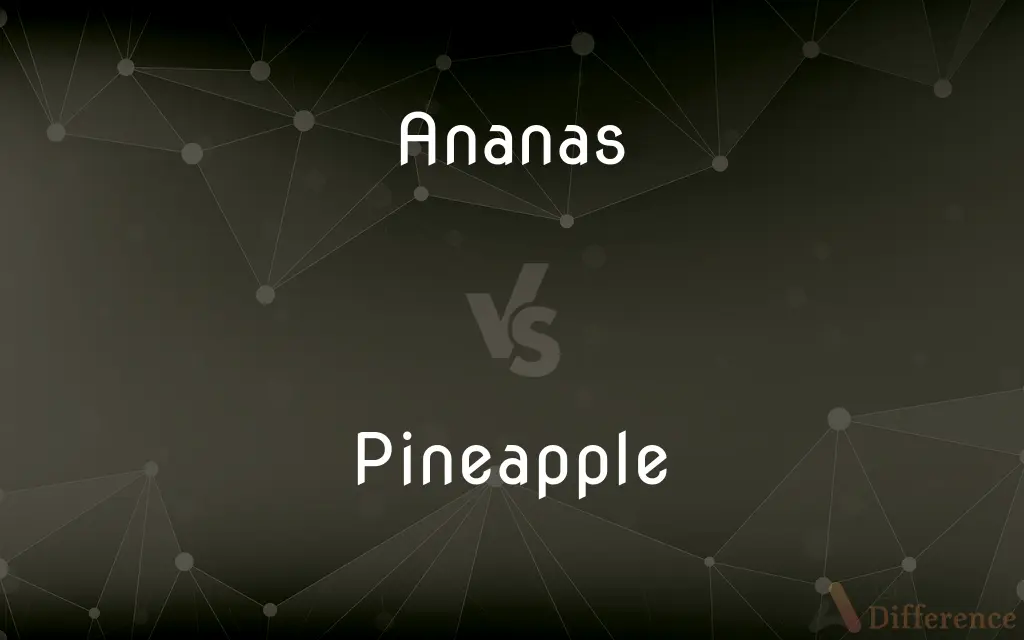Ananas vs. Pineapple — What's the Difference?
By Tayyaba Rehman — Updated on October 12, 2023
Ananas is the word for pineapple in many languages. Pineapple is the English term for the tropical fruit. Both refer to the same fruit but differ in linguistic origin.

Difference Between Ananas and Pineapple
Table of Contents
ADVERTISEMENT
Key Differences
Ananas is a term derived from the Tupian word "nanas", which means "excellent fruit". This word is used in many languages, including French, Dutch, and German, to name the fruit. On the other hand, Pineapple is a uniquely English term which is descriptive of the fruit's appearance resembling a pine cone.
Ananas is widespread in usage around the globe, especially in Europe. Travelers or immigrants to English-speaking countries might be more familiar with the term "ananas" before encountering the word Pineapple.
Pineapple not only denotes the fruit but also carries cultural significance, especially in English-speaking regions. For example, the pineapple is a symbol of hospitality in certain parts of the world. Despite this, Ananas holds its own cultural weight in non-English speaking regions.
In the culinary world, regardless of whether it's referred to as Ananas or Pineapple, this fruit is celebrated for its versatility. From desserts, cocktails to savory dishes, both terms refer to a fruit loved globally.
Comparison Chart
Linguistic Origin
Tupian word "nanas"
English word "pine" + "apple"
ADVERTISEMENT
Usage Region
Mostly non-English-speaking countries
English-speaking countries
Cultural Weight
Varies by region
Symbol of hospitality in certain areas
Culinary Use
Same as pineapple
Used in desserts, cocktails, savory dishes
Recognizability
Might be unfamiliar in English-speaking regions
Recognizable globally but primarily in English regions
Compare with Definitions
Ananas
A tropical fruit with tough, spiky skin and sweet, yellow flesh.
I made a delicious smoothie with ananas and mango.
Pineapple
A sweet tropical fruit with a rough exterior and yellow interior.
She added pineapple chunks to the fruit salad.
Ananas
The plant from the bromeliad family that bears this fruit.
The ananas plant requires warm conditions to thrive.
Pineapple
A fruit ingredient popular in pizzas, juices, and desserts.
Pineapple upside-down cake is one of my favorites.
Ananas
A term used in many languages to refer to the pineapple.
In France, they call pineapple ananas.
Pineapple
The plant of the family Bromeliaceae which produces this fruit.
The pineapple plant takes about two years to bear fruit.
Ananas
A fruit often used in desserts, salads, and cocktails.
The tart was topped with slices of ananas.
Pineapple
A representation of hospitality and welcome.
They gave us a pineapple as a gesture of friendship and warmth.
Ananas
A symbol of tropical regions and warm climates.
I bought an ananas print shirt for our beach vacation.
Pineapple
The pineapple (Ananas comosus) is a tropical plant with an edible fruit and the most economically significant plant in the family Bromeliaceae. The pineapple is indigenous to South America, where it has been cultivated for many centuries.
Ananas
Ananas is a plant genus in the family Bromeliaceae. It is native to South America.
Pineapple
A large juicy tropical fruit consisting of aromatic edible yellow flesh surrounded by a tough segmented skin and topped with a tuft of stiff leaves
Slices of pineapple
Roughly chop the pineapples and apricots
Ananas
(obsolete) Pineapple.
Pineapple
The widely cultivated tropical American plant that bears the pineapple. It is low-growing, with a spiral of spiny sword-shaped leaves on a thick stem.
Ananas
(obsolete) Bromelia pinguin, a plant with edible fruit.
Pineapple
A hand grenade.
Ananas
The pineapple (Ananassa sativa).
Pineapple
A tropical American plant (Ananas comosus) having large swordlike leaves and a large, fleshy, edible, multiple fruit with a terminal tuft of leaves.
Ananas
A genus of tropical American plants have sword-shaped leaves and a fleshy compound fruits composed of the fruits of several flowers (such as pineapples)
Pineapple
The fruit of this plant.
Ananas
Large sweet fleshy tropical fruit with a terminal tuft of stiff leaves; widely cultivated
Pineapple
(Slang) A hand grenade.
Pineapple
A tropical plant, Ananas comosus, native to South America, having thirty or more long, spined and pointed leaves surrounding a thick stem.
Pineapple
The ovoid fruit of the pineapple plant, which has very sweet white or yellow flesh, a tough, spiky shell and a tough, fibrous core.
Pineapple
(uncountable) The flesh of a pineapple fruit used as a food item.
Pineapple
(slang) An Australian fifty dollar note.
Pineapple
A web burrfish (Chilomycterus antillarum, syn. Chilomycterus geometricus)
Pineapple
A light yellow colour, like that of pineapple flesh (also called pineapple yellow).
Pineapple
A pinecone; the cone of the fir.
Pineapple
A decorative carving of a pineapple fruit used as a symbol of hospitality.
Pineapple
(slang) A hand grenade. From the similarity to the shape of a pineapple fruit.
Pineapple
A hairstyle consisting of a ponytail worn on top of the head, imitating the leaves of a pineapple.
Pineapple
A tropical plant (Ananassa sativa); also, its fruit; - so called from the resemblance of the latter, in shape and external appearance, to the cone of the pine tree. Its origin is unknown, though conjectured to be American.
Pineapple
A tropical American plant bearing a large fleshy edible fruit with a terminal tuft of stiff leaves; widely cultivated in the tropics
Pineapple
Large sweet fleshy tropical fruit with a terminal tuft of stiff leaves; widely cultivated
Pineapple
An English term used to describe a fruit resembling a pine cone.
The word pineapple aptly describes the fruit's appearance.
Common Curiosities
Is the taste of Ananas different from Pineapple?
No, Ananas and Pineapple refer to the same fruit and have the same taste.
Are there dishes where Ananas is preferred over Pineapple in naming?
The preference is linguistic. In French dishes, for example, Ananas might be used, while in English dishes, Pineapple is common.
Where does the word Ananas originate?
Ananas originates from the Tupian word "nanas", meaning "excellent fruit".
Why is the English term Pineapple and not Ananas?
The term Pineapple comes from its resemblance to a pine cone, combining "pine" and "apple".
Is it correct to say "Ananas juice" in English?
While understandable, in English it's more common to say "Pineapple juice".
Is the pineapple plant the same as the ananas plant?
Yes, they both refer to the same plant from the bromeliad family.
Why is pineapple a symbol of hospitality?
In history, pineapples were rare and often given as a sign of welcome and friendship.
What is Ananas?
Ananas is the term for pineapple used in many non-English-speaking countries.
How is Pineapple different from Ananas?
They both refer to the same fruit; Pineapple is the English term, while Ananas is used in many other languages.
How long does it take for an Ananas or Pineapple plant to bear fruit?
It typically takes about 18-36 months for the plant to produce fruit.
Do Ananas and Pineapple have the same nutritional benefits?
Yes, since they refer to the same fruit, they have identical nutritional profiles.
Why do some people say Ananas pizza and others say Pineapple pizza?
The choice of term depends on linguistic preferences and regional influences.
Is the Ananas fruit native to the Americas?
Yes, both Ananas and Pineapple refer to a fruit that is native to South America.
Can I find Ananas in American supermarkets?
Yes, but it'll likely be labeled as Pineapple.
How did the word Pineapple come to represent the fruit in English?
It was named Pineapple due to its resemblance to a pine cone.
Share Your Discovery

Previous Comparison
Recreation vs. Recreate
Next Comparison
Sausage vs. BoereworsAuthor Spotlight
Written by
Tayyaba RehmanTayyaba Rehman is a distinguished writer, currently serving as a primary contributor to askdifference.com. As a researcher in semantics and etymology, Tayyaba's passion for the complexity of languages and their distinctions has found a perfect home on the platform. Tayyaba delves into the intricacies of language, distinguishing between commonly confused words and phrases, thereby providing clarity for readers worldwide.
















































